In Freetown, Sierra Leone, sanitation challenges and risks are enormous, complex, and recurring. The risks are multi-layered and city-wide, including flooding, water contamination and the spread of rodents and mosquitoes. The outcomes are more dire for residents of informal settlements, where sanitation services and interventions are fragmented and less inclusive.
Through Shock Tactics – a research collaboration between IDS and the Sierra Leone Urban Research Centre (SLURC) – a participatory sanitation learning intervention is being piloted in two informal settlements (Moyiba and CKG) in order to co-learn the complex sanitation challenges they face and how risks accumulate over time. Led by the Federation of Urban and Rural Poor (FEDURP) alongside other community groups, the intervention aims to increase sanitation awareness and practices, and began with a capacity building workshop for residents and a community learning exchange visit. Drawing on lessons from the collaborative intervention, this blog explores sanitation from the lens of participatory risk mitigation by marginalized urban residents.
Solid waste management challenges in Freetown
Freetown City has had successive changes of waste management policies and actors for several decades. The central government and the Freetown City Council (FCC) have applied diverse strategies, including the improvement of sanitation infrastructure, supporting youth in sanitation, and encouraging private sector investment. Operations within this sector have been affected by weak infrastructure, limited resources, limited land and the inability of communities to pay for waste collection services.
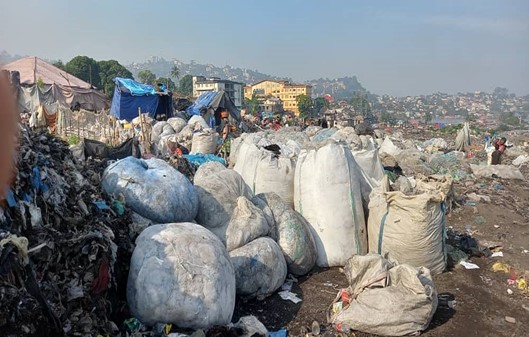
Top-bottom waste collection approaches
Waste collection services in Freetown’s informal settlements are not very inclusive, with limited conversations between informal settlement residents and service providers to address poor waste disposal practices. People who cannot afford waste collection fees have found illegal means to dispose of their waste, and one approach to address this is to impose penalties. However, this has only resulted in waste accumulation in public spaces.
Additionally, the lack of road infrastructure has affected access to services by people living in rugged mountainous terrains. Consequently, small and medium service providers were losing money, and became more inclined to serve wealthy clients who offer more financial incentives.
Faecal waste management problems
With few public toilet facilities within Freetown, open defecation is common in informal settlements, exposing residents to the risk of faecal materials. Estimates show that 75 percent of Freetown residents use unimproved sanitation facilities, with seven percent lacking access to any toilet facilities. People also engage in defecation habits known locally as “Black Berry” or DHL, where they dispose of faeces into open drains and rivers. This results in faecal waste drifting along water channels into the many informal settlements built along seafronts or riverbanks.
Impact of land management practices on sanitation
Freetown’s density has affected the sustainable use of land for waste management. With increased housing construction and economic activities after the civil war and health fragilities (including Ebola and Covid-19), land has been in high demand, affecting land availability for waste management. Freetown has only two designated landfills, which cannot accommodate the volume of waste from its population of over one million. Moreover, some areas designated by municipal authorities for waste dumping have been sold or reclaimed by private individuals.
Informal settlement characteristics and sanitation risks
The consequences of sanitation problems are widespread and multi-layered, particularly in environmentally fragile settlements. For example, when waste is poorly disposed of in built-up formal settlements, debris drifts to low-lying coastal informal settlements, which lack drainage infrastructure to contain the waste. This contributes to flooding and contamination of water used for drinking and domestic use, with dire health outcomes for downstream informal settlement residents.
Addressing sanitation risks in Moyiba
Moyiba is a hillside settlement in the far east of Freetown, which has experienced rapid population increase. The community lacks proper drainage facilities and waste dumpsites, and waste collection services are hampered by the steep and rugged hills and limited road access. Many residents are unable to pay for waste collection services. This results in rampant disposal of rubbish around water collection facilities, streams, and on roads, which then gets washed further down into the community. During peak rainy season, water seepages from decomposed materials penetrates water sources used for drinking. Additionally, toilet conditions are generally poor as most people use shared pit latrines.
Specifically, some community residents were depositing rubbish at a dam constructed by Action Contre La Faim (ACF), which was reported to be affecting the water quality. To address this issue, community planning meetings took place to agree on a plan and to generate resources. The meetings were attended by stakeholders including community chiefs, youth, women, and other residents. The key action point from these discussions was the cleaning and fortifying of the dam with sticks to prevent further waste dumping. Many residents who supported this initiative showed good will by agreeing to be part of awareness-raising activities.
Additionally, the Community Disaster Management Committee (CDMC) and the United stakeholders in Moyiba held community-wide sensitisation activities to raise awareness about poor waste dumping and encourage proper waste management practices. They are also working with community chiefs to enforce bylaws against poor waste disposal, particularly in public spaces, such as streams.

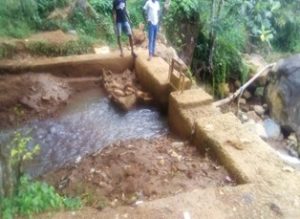
Addressing sanitation risks in CKG
The CKG settlement is located along the Congo River in central Freetown, situated near the Kingtom dumpsite. The Congo River has been contaminated with household and human waste that has drifted from upstream areas. Residents are also exposed to the spread of rodents, mosquitoes, and the pungent smell of decomposing rubbish. Moreover, waste collection services within the community are inefficient, partly because of low sanitation awareness. High levels of poverty and deprivation also encourage scavenging for food and scrap materials, which people sell to make a living.
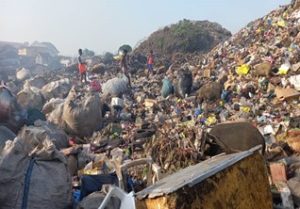
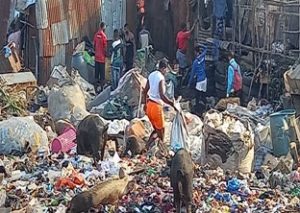
Toilets are mostly makeshift hanging facilities along the Congo River. Use of these improvised facilities is prompted by the inability to afford the cost of installing improved types. Very few people have access to flush facilities, and the few available are mostly shared by households or several members within a household.
CDMC led community-wide sensitisation activities to address poor waste management practices in CKG, including household visits where sanitation volunteers demonstrate the health benefits of proper waste management and share safe ways of managing household waste with residents. Volunteers encourage residents to consider paying for waste collection services to minimise waste accumulation within households.
Volunteers have also started monthly cleaning of the drainages and Kingdom dumpsite, starting from the peak of the rainy season when drainages are often clogged with rubbish. Community stakeholders are discussing ways to improve drainage construction to prevent clogging. The critical challenge to this plan is funding, but community stakeholders hope to receive support though their municipal councillor who is expecting city council funding.
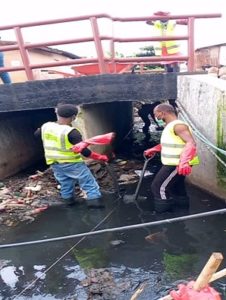

Co-producing solutions to sanitation problems
The conversations and learnings we have had together with marginalised urban informal settlement residents throughout this project have renewed opportunities to prioritise and empower community members to scale up their actions for change. The ingenuities of the marginalised urban poor in Freetown are limitless. If engaged in a collegial way, communities can contribute innovative ideas to address sanitation risks. We hope to continue working with residents to co-produce solutions to sanitation problems.